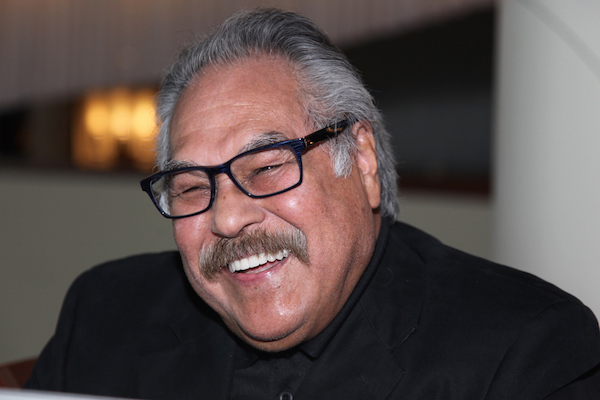Luis Valdez is a playwright, screenwriter, and director, best known as the creative force behind the 1987 movie La Bamba and the 1981 film Zoot Suit. He also founded the educational theater group El Teatro Campesino, affiliated with César Chávez’s United Farm Workers Union in 1965. Traveling on a flatbed truck from field to field, the troupe produced skits about the lives and causes of farmworkers. Before participating in a discussion about how to film the Mexican-American story, Valdez talked about the word you’ll most often hear coming out of his mouth, little-known stories about his hometown of Delano, California, and his obsession with radio programs of the 1940s.
Q: What’s your favorite song from a movie?
A: I love The Godfather theme. That’s really exciting. It conveys so much and it evokes that movie, the whole trilogy. It’s so rich and so deeply emotional. I love it.
Q: What’s your favorite pizza topping?
A: I really love vegetarian pizza. I like feta cheese. I’m not a big fan of pepperoni or anything like that. Once in a while, I have it. I never say absolutely no to anything. But if I have a choice, I go with veggie.
Q: What’s your guilty TV watching pleasure?
A: You know I watch a lot of news and documentaries. Those are my favorite. I do occasionally watch fantastic stuff—so, probably Game of Thrones right now.
Q: What was your favorite school play when you were growing up?
A: I did [Eugene] O’Neill in high school. That was a stretch. We lacked actors and it had to be colorblind casting.
Q: What’s one thing most people don’t know about Delano, California, the town where you were born?
A: I think a lot of people don’t know it was founded in the middle of a depression in 1873, when everything came crashing down. The railroad was big, but it was a bubble that busted. The Chinese workers building railroad lines were left stranded in the middle of the San Joaquin Valley. They were laid off—had no place to go. So they camped out by the side of the railroad. Then a cholera epidemic hit and they died. They buried the Chinese workers by the railroad. That area developed into Chinatown. I was born in Chinatown 70 years later.
Q: What profession would you like to practice in your next life?
A: I was a math and physics major before I switched majors to English. I was into the sciences and I still am. I would probably go back and continue the pursuit of physics.
Q: What word or phrase do you use most often?
A: It’s Spanish: órale. It means—yeah, let’s go, right on. It’s an active verb and at the same time it describes a state of being. I use that a lot in writing and speaking. Ritchie Valens said, “Come On, Let’s go.” That’s what attracted me to that song.
Q: How do you pass the time when you’re stuck in traffic?
A: I get my earphones and I talk to people. I carry on a million conversations. These days you can carry on business wherever you are. In some cases, I like to listen to radio programs. I love the old-fashioned radio programs—comedies, The Lone Ranger, stuff from the ’40s. That was when narrative radio was at its peak.
Q: What’s your favorite household chore?
A: Believe it or not: taking out the garbage. It’s symbolic.
Q: What year, past or future, would you time travel to if you could?
A: I’d come back 50 years from now. Looking back at 50 years of work with my company since 1965, I’ve seen tremendous changes. I’d like to see where the drift is going. I think we’re redefining what it means to be American and what it means to be an American as a world citizen.










